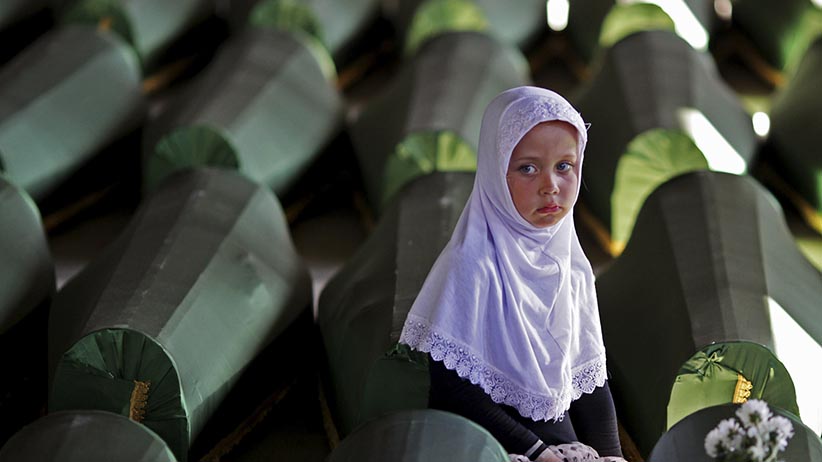Good news, bad news
Brazil’s world-class World Cup party and the ending no one wanted in a Calgary missing persons investigation
A girl sits next to a coffin of her relative, one of the 173 coffins of newly identified victims from the 1995 Srebrenica massacre, in the Potocari Memorial Center, near Srebrenica, July 9, 2014
Share

Good News
Next goal wins
Brazil proved up to the challenge of the 2014 World Cup of Soccer, or at least the country did. While the home side crashed out of the tournament in ignominious fashion—losing 7-1 in the semifinals—Brazil put on a world-class party throughout the month-long, 32-country tournament. The climactic final was a marvel of sportsmanship and drama, pitting the world’s best team (Germany) against the world’s best player (Argentina’s Lionel Messi). The 1-0 score in extra time left no doubt how close the competition really was.
One step at a time
Rome wasn’t built in a day; neither was Canada. Two developments last week point to progress on long-standing issues of federal-provincial aggravation. The premiers of British Columbia, Alberta and Saskatchewan wrote their fellow provincial and territorial leaders to urge new emphasis on removing interprovincial trade barriers. And Ottawa launched its Co-operative Capital Markets Regulatory System, comprised of B.C., Saskatchewan, Ontario and New Brunswick, as a substitute for its failed national securities regulatory plan struck down recently by the Supreme Court. With luck, every province will eventually join both efforts.
Bishop equality
The stained-glass ceiling has been permanently shattered at the Church of England. This week, it overwhelmingly voted in favour of allowing women to serve as bishops, the most senior order of clergy. The move, long urged by British politicians as well as congregations around the world, marks the final hurdle for women in the Church—female priests having been ordained in Britain beginning in 1994. The archbishop of Canterbury, the Most Rev. Justin Welby, said the exclusion of women from the upper ranks was “almost incomprehensible.”
Sweet truth
After years of pressure from health groups, Ottawa has finally agreed to standards on sugar consumption and labelling. New rules will require food manufacturers to group sugars together as one item on ingredients lists, putting greater emphasis on the total amount of sugar in a product. And for the first time, Canada’s Food Guide will set a daily recommended limit of no more than 100 grams of sugar per day. It’s a far cry from the levels proposed by the World Health Organization, but a slight decrease from current Canadian intake. Every little bit helps.

Bad News
The ending nobody wanted
The search for missing Calgary couple Alvin and Kathryn Liknes and their five-year-old grandson, Nathan O’Brien, took a heartbreaking turn as suspect Douglas Garland was arrested and charged with three homicides. Detectives have not found remains of the trio, but said an accumulation of evidence convinced them that it was a murder case. The two-week, province-wide amber alert for Nathan and the Likneses was suspended.Garland, 54, has a sister who married into the Liknes family and is a chemist with a history of illicit drug manufacturing.
Out in the cold?
As LeBron James announced his return to the NBA’s Cleveland Cavaliers, making the wildest dreams of northeast Ohio come true, all eyes turned to Canadian phenom Andrew Wiggins, drafted first overall by the Cavs in June. With “the King” back in town, the Cavaliers are likely to become a contender, but the franchise is thought to be planning a trade with Minnesota for rebounding machine Kevin Love. The obvious quid pro quo is Wiggins, which would mean a move to a team that is 24-56 over the last three seasons without Love in the lineup. But at least it’s not much further from Toronto.
Not that Ontario needs money . . .
Researchers at St. Michael’s Hospital in Toronto confirmed what had been suspected for years: a program which gave doctors bonuses for raising rates of cancer screening accomplished nothing. The province handed out $110 million over four years to steer more patients toward tests for colorectal, cervical and breast cancers. Screening rates grew only for colorectal cancers—but because there was no controlled pilot study, the rise could have been attributable to a province-wide publicity effort made at the same time.
A spreading shadow
Human Rights Watch (HRW) announced that the civilian death toll from attacks by northeast Nigerian terror group Boko Haram came to “at least” 2,053 in the first six months of 2014. Boko Haram, an Islamist radical group whose name means “Western education is sinful,” is best known for kidnapping 200 schoolgirls in April. Their whereabouts are still unknown to authorities, and relations between the girls’ families and the government of President Goodluck Jonathan are growing increasingly bitter. In the meantime, says HRW, Boko Haram terror attacks are taking more lives and gradually extending to Abuja, the capital.